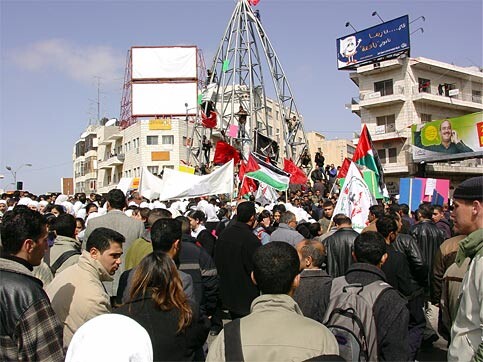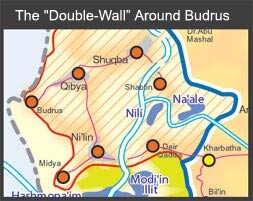The Electronic Intifada 15 July 2004
Palestinians asked the International Court of Justice (ICJ) to review the legality of the Apartheid Wall being built by Israel on our land since 2002. We hope that a just decision will help to save our land, our existence, and our dream of a viable and independent state with borders open to our neighbors.

As part of a mass mobilization throughout the Occupied West Bank and Gaza against the Apartheid Wall, over 1500 inhabitants of Ramallah and the surrounding villages, including Budrus, took to the streets to demonstrate in support of Palestine at The Hague, 23rd February 2004. (StopTheWall.org)
The ICJ verdict declaring the illegality of the path of the Wall strengthens the international legitimacy of our struggle for independence and freedom. Though this decision will likely join the numerous UN resolutions that Israel has ignored, such declarations by international bodies form the basis for a just resolution to the Israeli-Palestinian conflict.
No matter how Israel responds to the ICJ decision, Palestinians will continue to stand up for our right to live on our land. The cause of the conflict is Israeli occupation of our land. A just resolution requires two peoples with two states, living side by side.
If the wall is completed as planned, my village of Budrus and eight neighboring villages in the northwestern Ramallah area will be isolated from the city of Ramallah. The 20,000 residents of these nine villages will be imprisoned by the wall. To construct the wall, the Israeli government uproots our trees and destroys our land and houses. The wall prevents people from farming their land and from accessing schools, hospitals and water sources.

Israel’s West Bank Barrier, shown in red and in blue, will make life in the trapped communities near impossible. This is an excerpt from the Anti-Apartheid Wall Campaign’s November 2003 poster map. See the complete map here. (Graphic: StopTheWall.org)
The Palestinian people have tried large-scale peaceful civil resistance against the Israeli occupation at various times since 1967. Each time, non-violence was crushed by Israeli government-sponsored violence. When non-violence failed to bring freedom and independence, some people turned to violent struggle.
In 2003, our nine villages put together a strategy to peacefully resist the wall. First we formed grassroots committees uniting political factions with organizations such as village councils, schools, youth clubs, and women’s committees. Rather than being imposed from above, grassroots committees represent the needs of the people.
We also encouraged people to believe that “We Can Do It.” The wall is not an inalterable destiny. It is an unjust decision by the Israeli government that with our effort and struggle can be stopped.
Finally, we began a “third uprising” against the wall - an “Intifada” with an approach based entirely on peaceful confrontation. We confronted the Israeli Army and its uniforms and weapons, with only our bodies, our belief in God and in the righteousness of our cause. As in the first Intifada, participation in our protests was broad-based, involving men and women, the elderly and children.
Will anybody respect us or will history remember us if we do not struggle for our rights? We resist the bulldozers without even a stick or a stone, although these bulldozers are accompanied by hundreds of soldiers with batons, plastic coated metal bullets, and live ammunition. In each of our non-violent demonstrations, tens of participants were seriously injured. In demonstrations throughout the West Bank, six protestors were killed even though none had any kind of weapon.
Our non-violent struggle is supported by international and Israeli peace activists. Our children were used to seeing Israelis and Jews only as soldiers or settlers. Now they also see Israelis, Jews, Americans and other internationals supporting them and helping Palestinian voices to reach the rest of the world.
An American Jewish activist once said to me, “Those who love America should strengthen its role as the sponsor of worldwide peace and development, not as an oppressive, arrogant country that only supports the interests of one party in a conflict. And those who love Israel should help build a just nation, and not one that denies the rights of another people.”
We ask Americans, with their close relationship to Israel, to consider the words of the Prophet Mohammed, peace be upon him, who said: “Give support to your brother, be he oppressed or oppressor.” The people replied to Mohammed: “We can support the oppressed, but how can we support an oppressor?” And the prophet answered: “By telling him not to oppress. That is support for him.”
Related Links
Ayed Morrar, who lives in Budrus, is a leading voice in the Popular Committee Against the Wall. Morrar saw a February 2004 article published in Canada’s Globe and Mail.


